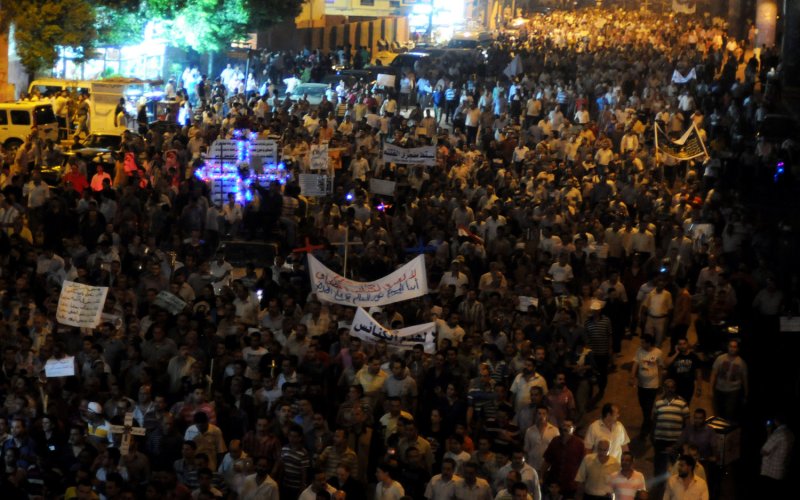Thousands of Egyptian Coptic Christians march in Cairo during a protest against Muslim attacks on Christian churches in southern Egypt, on October 9, 2011. Clashes erupted between Christians, Muslims and security forces resulting in at least 19 deaths. UPI/Mohamad Hosam |
License Photo
CAIRO, Oct. 10 (UPI) -- As revolutionary Egypt is convulsed once again by troops fighting protesters in the streets there are growing concerns that the self-appointed ruling military council is dragging its feet on setting up a post-Mubarak civilian government to buy time so it can stay in power.
The clashes Sunday in downtown Cairo were the bloodiest incidents since the 18-day pro-democracy revolution that ended with the downfall of President Hosni Mubarak after three decades in power.
The street battles involved Christian Copts, Muslims and troops and left at least 24 people dead and some 200 wounded.
These events raised questions about whether the generally peaceful transition, supposedly toward a new era of democracy after decades of repression, will continue as Egyptians begin to organize politically.
These concerns have been heightened by suspicions that the Supreme Council of the Armed Forces, which took control after Mubarak was ousted, is delaying promised elections and other reforms while the generals consolidate power.
The SCAF has pledged that no military figures will run in planned presidential elections. But speculation has been mounting that the de facto head of state, Field Marshal Mohamed Hussein Tantawi, Mubarak's long-serving defense minister, may do just that.
Egypt's media has made much of television footage made Sept. 26 showing Tantawi dressed in civilian clothes, rather than the military uniform he usually wears, during a public appearance in Cairo, without his usual phalanx of bodyguards.
This was widely seen as a carefully orchestrated political ploy to set the scene for Tantawi's eventual emergence as a presidential candidate.
"The armed forces have no interest in staying in power for a long time," Tantawi declared Thursday.
But, he added, "We will not leave Egypt until we have fulfilled all we promised and do our duty toward the people."
"Modern Egyptian history is replete with members of the military who took over the top spot in Egyptian politics -- Gamal Abdel Nasser, Anwar Sadat and Mubarak all fit this profile -- and it would not be hard to envision Tantawi wanting to do the same," observed U.S. global security consultancy Stratfor.
"Whether it would lead to a return to the sort of unrest that occurred last winter is impossible to say.
"What is clear is that the military never lost control of the situation in Egypt during the peak of the protests, and as a result, true regime change … has not occurred."
Now, amid growing unease about SCAF's intentions, the council has unveiled an electoral timetable that puts back the reform program announced after Mubarak was forced to step down.
Elections for both houses of Parliament will begin in November, staggered over several months. The two chambers would together form a provisional constitutional assembly in March or April.
Then a new constitution would be written followed by a national referendum.
That would mean the earliest a presidential poll could be held would be late 2013 -- with SCAF running the country until then.
Meantime, the council has reintroduced Mubarak-era emergency laws that it had pledged to scrap and continues to employ military tribunals rather than civilian courts.
Rand Corp. analysts Jeff Martini and Julie Taylor wrote in the September issue of Foreign Affairs that the military has long had its own political and economic agenda and that the revolution played into the generals' hands.
"The break between the generals and Mubarak was not so sudden," they observed. "Over the past decade, the regime had begun to balance its reliance on the armed forces by cultivating a class of crony capitalists.
"The generals felt their influence slipping away as Mubarak disregarded their economic interests, ignored their advice on ministerial appointments, and organized a campaign to transfer power to his son against their wishes.
"Although the military did not seek to overthrow Mubarak, this year's demonstrations gave it an opportunity to restore its central position," Martini and Taylor wrote.
"Since ousting Mubarak and ascending to power, the SCAF has deftly channeled lingering public outrage over corruption toward those who threatened its own power, such as Mubarak's business cronies and members of his formerly ruling National Democratic Party.
"The generals now hope to create a system of carefully shaped democratic institutions that will preserve their power and reduce the chances that any single political group can challenge them."





